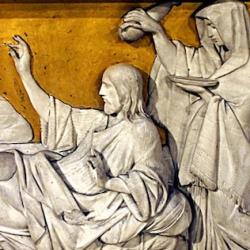Matthew 24:38-39: For the coming of the Son of Man will be just like the days of Noah. For as in those days which were before the flood they were eating and drinking, they were marrying and giving in marriage, until the day Noah entered the ark.
Only one passage of the Old Testament uses the phrase “days of Noah.” That is Isaiah 54, a prophecy about the restoration of Israel from exile, a promise that barren Israel will become a fruitful mother of children. In that context, Yahweh reminds Israel of the days of Noah.
But the point is not about judgment, or the suddenness of the flood. The point is about the reliability of God’s promise. In the days of Noah, after the flood, Yahweh “swore that the waters of Noah would not flood the earth again.” In the same way, He had sworn to Israel that, though He had forsaken them for a brief moment, He would have compassion on them. He had sword that He would “not be angry with you, nor rebuke you” (Isaiah 54:1-9). The promise to take Israel back into His love is as certain, as fixed and eternal, as His promise never again to flood the earth.
That promise is reiterated in Jesus’ own prophecy. Though the Son of Man will come in wrath against the people of Jerusalem , the Jews who have rejected Him and persecuted His bride, still Jesus promises that His anger will not last forever, and that He will have compassion as the Husband and Redeemer of Israel.
It is this promise that makes our eating and drinking here meaningful. Jesus warned that those who occupied themselves with eating and drinking, marrying and giving in marriage, would be taken by surprise. But that is not how we eat and drink. We eat and drink in anticipation; we eat and drink, like Israel , with our robes girded and our staffs in our hands; we eat and drink in alertness and readiness for the coming of the Son of Man.
That is to say, we eat and drink in the confidence that the Lord will do as He did in the days of Noah – that He will judge the earth in righteousness, and that He will turn is anger from us and have compassion on us with everlasting lovingkindness.











